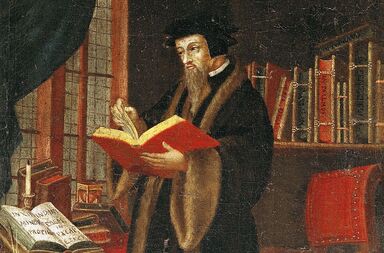BEING REFORMED
When we describe ourselves as “Reformed,” we do not mean that we were once troublemakers who have now cleaned up their act. That may be the case, but that’s not what the word means.
The Reformed tradition is a theological, intellectual, and cultural tradition within Protestant Christianity. Most people say it got its start with a thinker named John Calvin in the early and middle 16th-century. The movement flowered in Switzerland, England, Scotland, the Netherlands, and had some presence in the American colonies. Today, many Christians in the United States describe themselves as Reformed.
Reformed people stress a few beliefs about God that are not unique to them, but their collective common emphasis does form a certain theological identity. For instance, we take great comfort in the fact that God is in complete control over his creation. We believe we are all separated from God so profoundly (alienated) that none of us would ever work up the good sense to choose God if he didn’t specifically make us willing and able to do so. We like to look at the history of God’s working in the world as one big integrated operation, which often lends helpful insights to people whose readings of the Old and New Testaments cause them to wonder at how different things seem to be between them.
A lot of Reformed people appreciate the intellectual rigor in the Reformed tradition. There are, within the Reformed community, many great theologians, philosophers, and “apologists,” or people who defend the Christian faith using logical arguments. This doesn’t mean you need to be some kind of armchair intellectual to enter Skyview’s family, but it does mean that if you’re looking for an intellectually robust faith, the Reformed tradition is happy to oblige.
Ultimately, Reformed people unite with other Christians in an embrace of the Christian Gospel: the message that human beings are even more hopelessly separated from God than they think, and when they put their faith in Christ, more loved by him than they had dared to hope. This is the message we live for and seek to make central to everything.
The Reformed tradition is a theological, intellectual, and cultural tradition within Protestant Christianity. Most people say it got its start with a thinker named John Calvin in the early and middle 16th-century. The movement flowered in Switzerland, England, Scotland, the Netherlands, and had some presence in the American colonies. Today, many Christians in the United States describe themselves as Reformed.
Reformed people stress a few beliefs about God that are not unique to them, but their collective common emphasis does form a certain theological identity. For instance, we take great comfort in the fact that God is in complete control over his creation. We believe we are all separated from God so profoundly (alienated) that none of us would ever work up the good sense to choose God if he didn’t specifically make us willing and able to do so. We like to look at the history of God’s working in the world as one big integrated operation, which often lends helpful insights to people whose readings of the Old and New Testaments cause them to wonder at how different things seem to be between them.
A lot of Reformed people appreciate the intellectual rigor in the Reformed tradition. There are, within the Reformed community, many great theologians, philosophers, and “apologists,” or people who defend the Christian faith using logical arguments. This doesn’t mean you need to be some kind of armchair intellectual to enter Skyview’s family, but it does mean that if you’re looking for an intellectually robust faith, the Reformed tradition is happy to oblige.
Ultimately, Reformed people unite with other Christians in an embrace of the Christian Gospel: the message that human beings are even more hopelessly separated from God than they think, and when they put their faith in Christ, more loved by him than they had dared to hope. This is the message we live for and seek to make central to everything.


